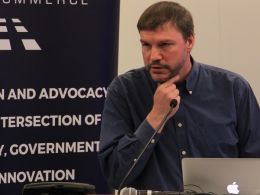
Microsoft, Harvard, UCL Take Steps to Bulletproof Smart Contracts
Ethereum’s community is standing up to the challenge of securing smart contracts by taking steps to implement the lessons learned from the DAO. Microsoft Research, Harvard University and Inra, a French national research institute that employs 2700 computer science researchers from the “world’s most prestigious universities”, have published a highly technical paper [PDF] on the formal verification of smart contracts. The paper presents a framework to analyze and formally verify Ethereum smart contracts using F*, a “functional programming language aimed at program verification.” The initial....
Related News
"The two things to know about smart contracts is that they’re dumb, and they’re not contracts." This statement from Harvard Berkman Center's Patrick Murck seems increasingly relevant in the wake of the collapse of The DAO. The ethereum-based fund was the largest smart contract issued to date, and its failure has led many to reconsider how ready the technology is for primetime. At their core, smart contracts facilitate decentralized applications by eliminating trust points. Because they automate existing processes, many believe smart contracts could someday lower costs across....
Microsoft has revealed it is organizing a working group dedicated to improving smart contracts security. Named 'Kinakuta', the group aims to make it easier for the industry to share information and tips about smart contracts, the term that somewhat loosely has come to refer to self-executing blockchain-based code. Yet even while incumbents increasingly express interest in the idea blockchains could come to automate complex transactions, concerns about this use case have grown after a vulnerability led to the collapse of the technology's first large-scale implementation, The DAO. Since....
More than 20 years ago, Nick Szabo proposed the use of a 'smart contract' to reduce fraud and enforcement costs associated with traditional paper contracts. His smart contract would be implemented as a “computerized transaction protocol that executes the terms of a contract” – in other words, a computer program. Like any other software, a 'smart contract' computer program would receive inputs, run a series of program steps, and supply outputs. For example, the smart contract could wait for a predetermined condition to occur (eg: a stock reaches a particular price), automatically deem the....
No, smart contracts will not rid the world of lawyers, despite the greatest efforts of blockchain innovators. At least, that's according to Nick Szabo, the man widely credited with inventing the smart contract concept itself. During the keynote address at the Smart Contracts Symposium at Microsoft's New York headquarters this week, Szabo gave an update on the industry he helped create – a talk that was followed by a string of commenters from smart contract startups. Addressing a group of about 250 people (comprised largely of members of the blockchain trade association, the Chamber of....
A law firm in New York is reviewing how the use of the blockchain technology can remove many of the manual steps that are required when it comes to executing smart contracts. The law firm, Hogan Lovells, is considering how smart contracts and the blockchain can automatically execute agreements without the need for human interaction, thus helping to free up lawyers time. In a blog from the Wall Street Journal, the use of smart contracts will ensure that terms of a contract are enforced in a faster time; however, this also means that there needs to be a closer relationship between the....





